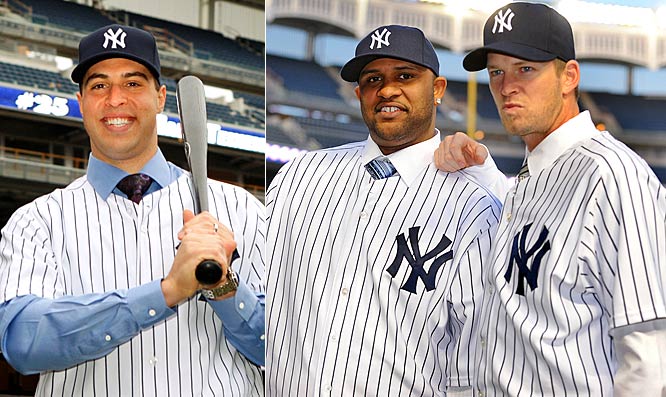 |
| At least college athletes cannot be corrupted with money. Or CAN they? 1 |
 |
| Longoria, Upton, and Crawford - one of these people will not belong...next year. 2 |
Teams like the Yankees, which pick the bones off of teams that have developed prospects into major league stars, are responsible for two undesirable fates for franchises. One result is a team like the Rays, which build themselves into contenders from scratch, only to be forced to start over and reload after a few seasons because their young stars are eligible for free agency. The other result is a team like the Pittsburgh Pirates.
 |
| Mark Teixeira, C.C. Sabathia, and A.J. Burnett - for a couple of hundred mil, they (and a pennant) can be yours! |
Irrelevant franchises and franchises with three year windows of opportunity to win a World Series as a reward for recruiting dynasty-caliber talent are bad. They are bad for baseball. They are bad for all but the wealthiest franchises. And they are bad for the average baseball fan. This is not lost on fans, who continue to be treated as lemmings by the leadership of Major League Baseball.
As mentioned previously, the Rays had the American League's best record in 2010, yet ranked near the bottom of the major leagues in attendance, even in the waning weeks of the season while engaged in a tightly contested battle for the American League East division title. How many fans are going to be fired up to hand their hard-earned money over to the Rays for season tickets or partial packages in the regular season when the core of the team will not be together after the playoffs? Why get too excited and emotionally (and financially) invested in a team that plans to break itself up and sell of the parts, so to speak? Sure, people will show up for playoff games because they are very meaningful. But the attendance problems, which begin with ticket package sales, in Tampa are not going away until the fans see long term value in return for their time and money.
 | |
| Unless they scout and draft to perfection, we will never see a uniform like that on a player like this (or any player participating in the post season or in front of a home sellout) ever again. |
The solution is simple. It is a remarkable concept that has brought parity to the National Football League and the National Basketball Association. It is called a SALARY CAP! By capping the total payroll for all teams, owners of each team are all playing on a level field with the Yankees, Red Sox, Dodgers, and any other big market club. It is understandable why players, who want to get paid, are not going to make a push for a salary cap. It is understandable that a minority of owners, those in mega media markets, would fight tooth and nail to avoid a salary cap. You cannot buy your way to the top if you cannot outspend your competition.
MLB cities can hope.
1) Image from Punting on Third (scottbergen.blogspot.com)
2) Image from sportsillustrated.com
3) Image from Joe's Locker Room (joeslockerroom.wordpress.com)
4) Image from mitchellandness.com
No comments:
Post a Comment